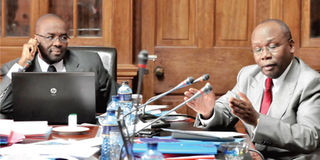Why judges are afraid of vetting

Photo | SALATON NJAU | NATION
The chairman of the Judicial Service Commission Justice Willy Mutunga (left) and Attorney-General Githu Muigai during the interview of candidates for the position of judges for the new Industrial and Labour Relations Court at the Supreme Court in Nairobi on June 13, 2012.
The “harassment” of judges during vetting because of past judgments is a challenge to the independence of judicial officers, a magistrate said on Wednesday.
Ms Emily Ominde, a representative of magistrates in the Judicial Service Commission (JSC), said there were rumours that some judges were afraid of making judgments unfavourable to powerful people for fear it would hurt them during vetting.
She spoke during the interview of Mr Onesmus Ndubuthi Makau, an advocate based in Machakos, for the position of judge in Industrial and Labour Relations Court.
During the interview it also emerged that lawyers were largely to blame for corruption in courts.
Tackle corruption
JSC members Florence Mwangangi and Ahmednasir Abdullahi, who are practising lawyers, made the allegations as they sought to know how Mr Makau would tackle corruption in the courts.
Mr Makau swore that he would not allow himself to get exposed to corruption situations.
The candidate said that all parties in court matters contributed to corruption, but Mr Abdullahi stated that from his experience as an advocate, lawyers made the first step in 80 per cent of corrupt practices.
Ms Mwangangi said she was recently criticised for publicly proposing that lawyers should also be vetted.
Lawyers even threatened not to re-elect her to the commission because of her remarks. “I still hold the same position,” she added, asking the candidate what he thought.
The candidate, however, maintained that there were bad elements from all sides. The interview was largely a discussion on corruption and effects of the ongoing vetting of judges and magistrates on the independence of judicial officers.
Members of the JSC panel openly expressed their thoughts regarding the two issues, seeking to know how the candidates would ensure integrity and independence in the face of tempting lawyers and vetting.
Nairobi Chief Magistrate Esther Maina Nyambura was also interviewed for the position. However, the interview was held in camera and lasted about 10 minutes. Journalists were only allowed in when the interview was about to end.
The magistrate later told the Nation that hers was short because she had been interviewed before for a High Court position. Her counterpart from Ogembo, Senior Principal Magistrate Daniel Ogolla Ogembo was interviewed for the Industrial Court post.
One candidate, Mr David Munyao Ndungi, opted out of the interview after the panel told him that he had been appointed a resident magistrate.
The Industrial Court currently has five judges – Justices Charles Chemuttut, Paul Kosgei, Stewart Madzayo, Isaac Mukunya and James Rika. They were appointed by the Executive for a renewable term of five years each.
However, when the Constitution was passed, the Industrial Court was renamed Industrial and Labour Relations Court, given the status of the High Court and placed under the JSC. Judges of the new court now have to be appointed like other judges.
Justice Rika and the current Industrial Court Registrar Hellen Wasilwa were among the 51 who applied to be hired as judges of the new court. Both were shortlisted, and Mrs Wasilwa has since attended the interview. Interviews are scheduled to end on June 25.




